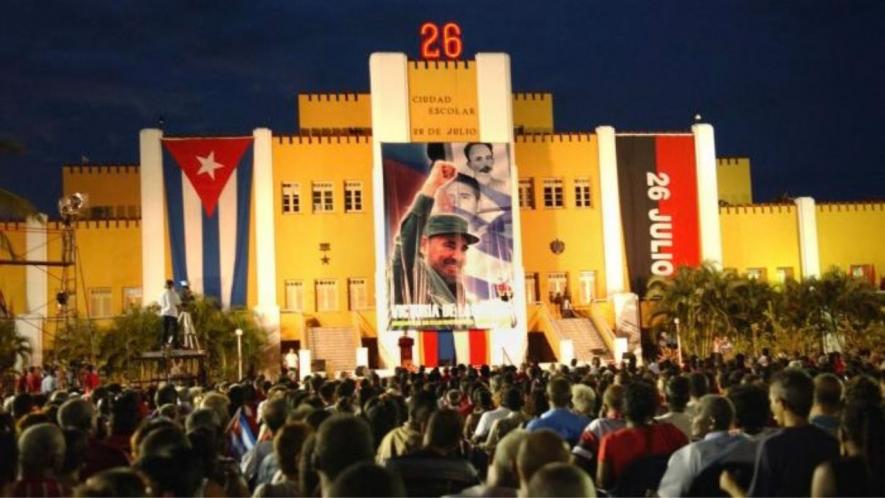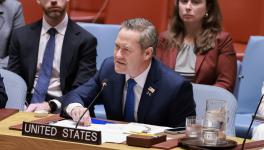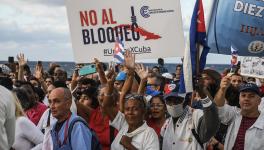Moncada: the Dawn of the Cuban Revolution

Commemoration of July 26. Photo: Juvenel Balán
July 26, 2023 marks 70 years since the attack on the Moncada and Carlos Manuel de Céspedes barracks in eastern Cuba. The attack on Moncada is of fundamental importance in the history of Cuba. This is not only because of the military importance of the fortress — the second biggest after Columbia in Havana — but also because of the bloody repression carried out by the tyrannical regime, which took dozens of valuable lives from a generation that with its blood would change the destiny of the island.
As a small tribute, it would be fitting to recall why the attack on Moncada was a turning point for the country.
A generation arrived at Moncada that had matured physically and politically in the universe of the neocolonial pseudo-republic that prevailed in Cuba from 1902 to 1959. A political universe tainted by corruption, American interference, coups d’état and political caudillismo, intermingled, of course, with elements of the worst gangsterism, which ended not infrequently in violent shootouts in the streets of several cities of the country. This was a generation that had grown up in what Cuban revolutionary writer Rubén Martínez de Villena rightly called a “Yankee factory”.
Their political mentors had been, in part, those who carried out the Revolution of 1930 against Gerardo Machado and had to deal with the betrayal of the government of the 100 days, the lonely death of the revolutionary Antonio Guiteras in El Morrillo, the rise of Batista from an obscure sergeant stenographer to the “hard man” of US policy in Cuba and the threat, which Ambassador Enoch Crowder and his successors liked so much, of the gunboats as a permanent reminder of the political submission of the island.
It was a generation that was born and grew up during the governments of the Authentic Cuban Revolutionary Party, which capitalized on the figure of Ramón Grau San Martín and the popularity of his government of 100 days due to Guiteras’ policies, but went on to plunge the country into a pit of corruption and violence.
This was a generation that was educated, for the most part, in public schools lacking fundamental resources, but with teachers who instilled in them a deep Martian (of José Martí) feeling of love for the homeland. That insurgent and anti-imperialist Martí who was saved by the best of the Cuban nation against the utilitarian, domestic, and comfortable image of Martí that the pseudo-republican governments tried to present.
As they were taking their first steps in politics, those young people saw how Eduardo Chibás, leader of the Orthodox Party, whose slogan was “Shame against money” and embodied the yearning for redemption of an entire people, committed suicide on air after a heated address on the radio. They also saw how the obscure sergeant stenographer, already a general and former president, executed his third coup d’état in March 1952, setting a sad record in the country’s history.
This political experience is what fed these young people. But they were not romantics, they were revolutionaries. They had a program of action, which would later go down in history under the name of the Moncada Program, which contained the main political and social demands for change.
Moncada is fundamental because it expressed the revolutionary radicalization of a generation, because it provided a clear minimum program, because it raised the figure of its leader Fidel Castro to a higher level, because it questioned the status quo not from discourse, but from action.
Moncada marked the beginning of a new phase of revolutionary struggle that six years later would become the definitive triumph of an army of poorly armed guerrillas against a modern army, contravening all established dogmas and demonstrating that one’s will also plays a role in history. An example being the story of the famous reunion in Cinco Palmas, after the catastrophe of Alegria de Pio, when a few survivors with only 7 rifles looked each other in the face. They faced an army of 80,000 soldiers with tanks, airplanes, and warships. And Fidel, excited, exclaimed: “Now we have won the war! Revolutions are daughters of objective circumstances, but also of a powerful exercise of individual and collective will.”
The triumph of January ‘59, with the almost immediate execution of the program of social justice and sovereignty endowed Moncada with its full meaning. In a very short time, the backbone of domination over Cuba was broken. The foundation of the large estates and landholdings were destroyed and the people became the main protagonists of their history. The Revolution of the humble, by the humble and for the humble became flesh, bodies in the streets, a multitude determined to give their lives.
Moncada was the dawn of this offensive. 70 years later, the Cuban people are still masters of their fate, making mistakes and achieving successes, paying the price of standing up to imperialism. With Moncada, a different Cuba was born. One capable of leaping above its stature, a Cuba that renounces the neocolonial fate that had been assigned to it and that can take its solidarity to all continents. A country driven by the dream that Fidel summarized in a phrase of Martí: We will conquer all justice!
José Ernesto Novaez Guerrero is a writer, journalist, and researcher from Santa Clara, Cuba. He coordinates the Cuban chapter of the Network of Intellectuals and Artists in Defense of Humanity and he works with several publications inside and outside the island.
Get the latest reports & analysis with people's perspective on Protests, movements & deep analytical videos, discussions of the current affairs in your Telegram app. Subscribe to NewsClick's Telegram channel & get Real-Time updates on stories, as they get published on our website.
























